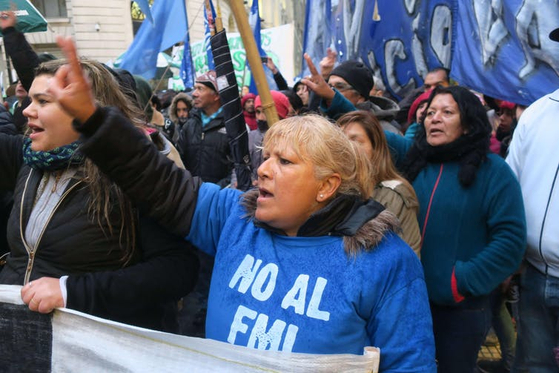As the novel coronavirus infection (Corona 19) sweeps the world, there are discussions in each country to “introduce a wealth tax.” The global economy is showing a’K-shaped recovery’, which is becoming more polarized, and the phenomenon of’poor-poor and rich’ is accelerating. In addition, as economic activity shrinks, even the tax revenues of each government will become scarce, and discussions on tax increases aimed at high-income families are expected to spark.
South America triggers the introduction of’wealth tax’

In Argentina, citizens appear on the streets to protest economic instability. AP=Yonhap News
It is the countries located in South America that have triggered the wealth tax. According to Bloomberg News on the 7th (local time), the Argentine Senate finally passed a bill to impose a one-time wealth tax on high-income people with assets of more than 200 million pesos (about 2.6 billion won) in December last year.
As the legislation passes, those who meet the income standard must pay taxes to the government, which amounts to 1-3% of all their property. Of these, it is said that an additional 50% or more tax is levied on foreign assets. This is due to the continuing phenomenon of high-income families taking their assets overseas as inflation became severe due to Corona 19.
In Bolivia and Peru, discussions about the introduction of a wealth tax are growing. In particular, Bolivia’s introduction of a wealth tax is realizing in November last year as candidate Luis Arse of the Progressive Socialist Movement (MAS) was elected president with overwhelming votes. One of his major pledges was the introduction of a wealth tax for high-income people.
Developed countries also become a reality after discussions on wealth tax

In France, a wealth tax was introduced in 2013 by the progressive president Francois Hollande, but it was abolished after two years. Photo = BBC Capture
Developed countries are also fiddling with wealth tax cards. U.S. President-elect Joe Biden opposes the introduction of a wealth tax, but in California and Washington state legislatures where Democrats dominate, discussions about the introduction of a wealth tax for high-income people, Bloomberg reported.
In France and Germany, controversy over the introduction of a wealth tax is reigniting. There is a precedent that the wealth tax was abolished after the introduction of the wealth tax in the past, but with the prolonged Corona 19, discussions on the wealth tax began again.
France introduced a wealth tax in 2013 by the progressive President Francois Hollande, but abolished it after two years. In Germany, after the abolition of the wealth tax in 1997, the progressive Social Democratic Party shouted for a revival of the wealth tax in 2019, but the ruling party, including Prime Minister Angela Merkel, showed negative reactions and collapsed.
Bloomberg said, “The advances argue that “the advancement in technology has improved financial transparency and access to capital, and as it is easier to manage wealth taxes than in the past, targeting the few ultra-high-income groups, we can correct the deficiencies of the past.”
‘K-shape growth’ and lack of tax revenue make it back to sleep

British firefighters in response to Corona 19. yunhap news
The reason why the discussion on the introduction of the wealth tax around the world is raising its head is because of the’K-shaped recovery’ of the global economy due to the prolonged corona 19 incident. The K-shaped recovery refers to the polarization of recovery rates by sector and class. The wealth tax is one of the ways to solve the deepening gap between rich and poor due to Corona 19.
One of the reasons for worrying about the wealth tax is that the barns of each government are empty. Economic activity has contracted due to Corona 19, and there is an emergency in securing tax revenues for each government. To make matters worse, spending for various policies, such as COVID-19 quarantine measures and support for low-income families, has grown, and it has become a situation to find a line of money.
A representative example is the UK, which implemented three blockade measures due to the spread of Corona 19. According to Bloomberg, the British government faced the biggest fiscal deficit since World War II as it struggled to secure tax revenues. Some experts suggested securing about £260 billion in tax revenue by imposing a one-time tax on some wealthy people. It is a plan to allow those who own more than £500,000 in assets (740 million won) to pay 1% of their assets in tax for five years.
Andy Summers, a professor at London Political and Economics University (LSE), told Bloomberg that “debate on reform of the tax system for the wealthy was slow in the past, but now the discussion on the introduction of a wealth tax is a serious agenda.”
Reporter Yoon Sang-eon [email protected]
